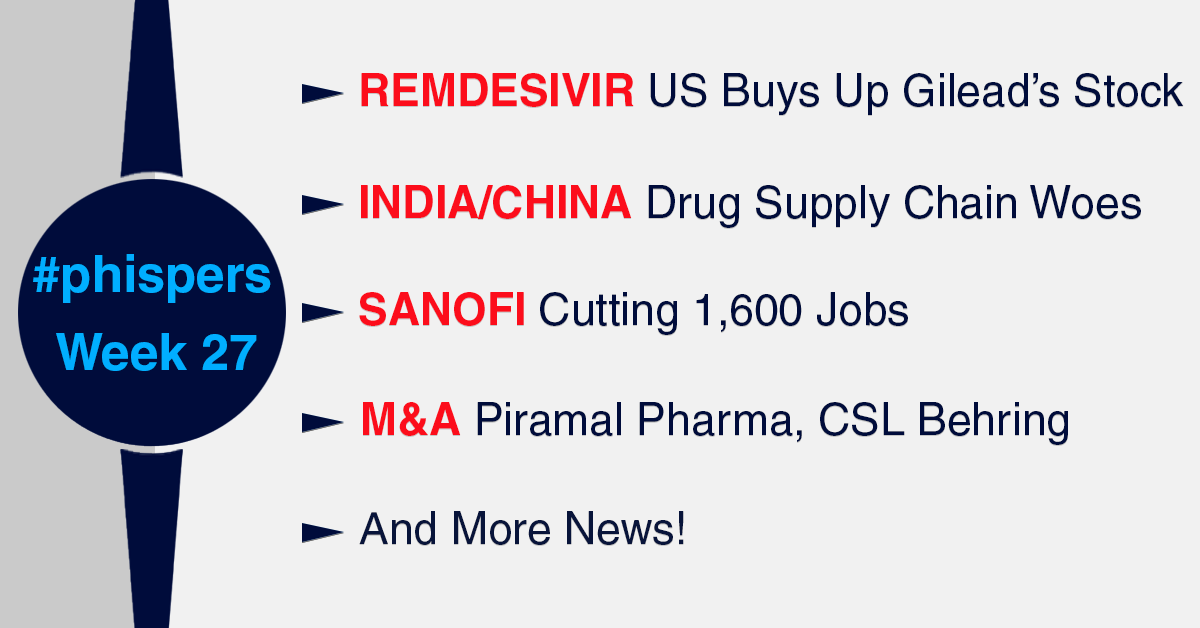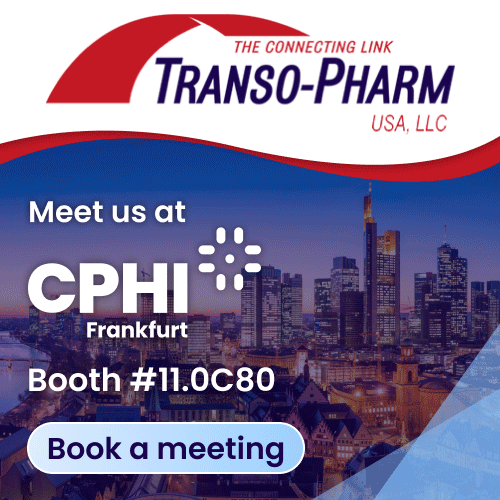
By PharmaCompass
2020-07-02
Impressions: 75116
This week, the Trump administration announced it would buyout global stocks of Gilead’s remdesivir for the next three months to fight Covid-19, while Gilead announced a tiered pricing for the antiviral drug in the US.
A border-related dispute between India and China led to both countries delaying each others’ consignments.
With India dependent on China for APIs and KSMs, the dispute is likely to impact the drug supply chain.
India has also banned 59 apps of Chinese origin, including WeChat that used to serve as the lifeline of communication between Indian and Chinese businesses.
The ban on WeChat will impact drug companies in both the countries. Meanwhile, there were reports that Sanofi plans to cut over 1,600 jobs across the world, including 1,000 in France.
Novartis agreed to pay US$ 345 million to settle bribery charges, while a verdict reduced J&J’s damages award in talc products lawsuits to US$ 2.12 billion from US$ 4.69 billion.
EMA nominated Emer Cooke as its new executive director.
In M&A deals, The Carlyle Group has invested US$ 500 million in Piramal Pharma, while CSL Behring has picked up rights to Dutch drugmaker UniQure’s experimental gene therapy for hemophilia B.
And, Novartis and Intercept faced setbacks as their key drugs fail to secure additional approvals.
US buys up world stock of Gilead’s remdesivir; Gilead announces tiered pricing
The US has bought up nearly all the stocks for the next three months of Gilead Sciences’ investigative antiviral drug — remdesivir — which has proven to speed up recovery time for patients severely ill with Covid-19 to 11 days from 15 days for those in the control group.
This move by the US would leave almost no stock of remdesivir for the UK and Europe. In 127 poor or middle-income countries, Gilead is allowing generic drugmakers to supply remdesivir. It has signed non-exclusive voluntary licensing agreements with generic pharmaceutical manufacturers based in Egypt, India and Pakistan to further expand the supply of the antiviral drug.
The Trump administration has bought more than 500,000 doses, which is all of Gilead’s production for July and 90 percent of August and September. The US has recorded more than 2.5 million confirmed cases of Covid-19.
“President Trump has struck an amazing deal to ensure Americans have access to the first authorized therapeutic for Covid-19,” Alex Azar, Secretary, Health and Human Services, said. “The Trump administration is doing everything in our power to learn more about life-saving therapeutics for Covid-19 and secure access to these options for the American people,” he added.
Experts have criticized America’s decision to hoard the drug, warning that such selfish behavior “sets a dangerous precedent for attempts to share scarce treatments amid the pandemic”.
Meanwhile, Gilead Sciences has announced a tiered pricing for remdesivir. It will charge US$ 2,340 for a typical treatment course for people covered by government health programs in the United States and other developed countries.
The price would be US$ 3,120 for patients with private insurance. The amount that patients pay out of pocket depends on insurance, income and other factors.
Gilead also said it has reached an agreement with HHS to allow the department and states to manage how the drug is allocated to US hospitals through September.
“We’re in uncharted territory with pricing a new medicine, a novel medicine, in a pandemic,” Gilead’s chief executive, Daniel O’Day, told The Associated Press.
“We believe that we had to really deviate from the normal circumstances” and price the drug to ensure wide access rather than based solely on value to patients, he said.
However, the price came under heavy criticism. A consumer group called it “an outrage” because of the amount taxpayers invested toward the drug’s development.
India-China standoff leads to supply chain woes; India bans drugmakers’ favorite WeChat app
Last week, the stand-off between India and China due to the ongoing border-related skirmishes led to supply chain issues in the pharmaceutical industry.
“Customs authorities have not been clearing consignments coming from China, and they haven’t been offering any reasons,” Dinesh Dua, chairman of Pharmaceutical Export Promotion Council of India (Pharmexcil), an authorized agency of the government of India for promotion of drug exports, had told The Hindustan Times.
These delays hindered the supply of key starting materials (KSMs), intermediates and active pharmaceutical ingredients (APIs). As a result, thousands of drug manufacturers and importers were having a distressing time.
According to reports, medical equipment such as infrared thermometers and pulse oximeters which are required to fight the Covid-19 pandemic were also stuck at the ports.
However, on Tuesday, the customs department in India decided to clear pharma raw material shipments from China after representations from industry bodies.
China retaliated by causing similar delays on the shipments of Indian exporters at ports in China and Hong Kong. According to news reports, China has ordered non-official go-slow orders for consignments of Indian-origin on their shores, leading to exporters incurring hefty penalties.
Meanwhile, Eswara Reddy, Joint Drugs Controller General of India, has urged industry stakeholders to develop strategies to make the drug industry self-reliant for APIs and KSMs.
“Knowing the fact that India is excessively dependent on China, importing of nearly 70 per cent of the APIs/KSMs is a cause of concern,” Reddy said. The Indian government has identified 58 APIs/KSMs for which the Indian pharma industry is heavily dependent on China. These imported APIs/KSMs are largely used for antibiotics, cardiovascular, vitamins, steroids, anticonvulsant, hormones, antiretroviral, antidiarrhoeal and antibiotics.
Ban on Chinese apps in India: The government of India has banned 59 apps of Chinese origin. The ban also applies to several social media platforms like TikTok, Helo and WeChat. Among other prominent apps are ShareIT, UC browser, Cam Scanner, DU Recorder and shopping app Clubfactory.
Since WhatsApp doesn’t work seamlessly in China, WeChat used to serve as the lifeline of communication between Indian and Chinese businesses. Therefore, the ban on WeChat is going to impact drug companies in both the countries.
Meanwhile, there was a gas leak at a pharma company — Sainor Life Sciences — situated in Visakhapatnam in southern India. Two workers died and four were hospitalized as benzimidazole gas leaked from the plant. Sainor Life Sciences produces commonly used proton-pump inhibitors (PPIs) like esomeprazole and omeprazole.
Sanofi to cut over 1,600 jobs; may develop restructuring plan soon
In the latest move by the new CEO Paul Hudson to cut costs, French drugmaker Sanofi is planning to reduce over 1,600 jobs.
Though Sanofi has not officially made an announcement, a Reuters report said around 1,000 jobs in France are said to be at risk. In Europe, the unions have been combating retrenchments.
According to the report, the management of Sanofi is likely to develop a restructuring plan soon. Though the vaccine and rare diseases unit Genzyme will reportedly not be affected by the reorganization, it could impact several European countries and others outside the region. The job cuts would take place over a three-year period, with no forced redundancies, the report added.
The discussions come after Hudson said in December that the drugmaker plans to reduce US$ 2.24 billion (€ 2 billion) in costs by 2022. He had joined the company in September 2019 from Novartis. “The Covid-19 (pandemic) had slowed the announcement, but (the measures) are part of the CEO roadmap,” a source told Reuters.
On June 16, Sanofi had said it would invest around US$ 686 million (€ 610 million) at two French sites to turn them into a hub dedicated to research, development and production of vaccines, with some 200 new jobs expected to be created on one of the locations.
Novartis to pay US$ 345 million to settle bribery charges; J&J verdict reduced to US$ 2.1 billion
A subsidiary of Swiss-drugmaker Novartis AG in Greece — Novartis Hellas SACI — and Alcon Pte Ltd, a former subsidiary of Novartis AG and current subsidiary of Alcon Inc, have agreed to pay a combined total of more than US$ 233 million in criminal monetary penalties to resolve the US Department of Justice’s (DOJ) probe into violations of the Foreign Corrupt Practices Act (FCPA).
The allegations pertain to the companies running schemes to bribe public hospitals and clinics in Greece, Vietnam and South Korea.
Novartis AG has also agreed to pay over US$ 112 million to the US Securities and Exchange Commission (SEC) in a related matter.
The settlements with Novartis and its former eye-care unit bring to a close investigations by the DOJ and SEC into alleged criminal and civil violations of the FCPA.
In February 2018, the Swiss drugmaker had got embroiled in a controversy regarding industrial scale bribery of senior politicians in Greece. Novartis allegedly bribed politicians to boost sales between 2006 to 2015. It also allegedly bribed thousands of doctors. Back in September 2018, Novartis had sought to clean its image by linking employee bonuses to their ethics scorecard.
J&J talc verdict: An appeals court in the US rejected Johnson & Johnson’s bid to throw out a jury verdict in favor of women who blamed their ovarian cancer on its baby powder and other talc products. However, the court reduced its damages award to US$ 2.12 billion from US$ 4.69 billion. Johnson & Johnson faces more than 19,000 lawsuits claiming that its talc products caused cancer because of contamination from asbestos.
EMA nominates Emer Cooke as new executive director
Last week, the European Medicines Agency’s (EMA) management board nominated Emer Cooke from a short list of candidates to succeed Guido Rasi as the agency’s next executive director. Once appointed, Cooke will be the fourth executive director in EMA’s 25-plus year history.
EMA had begun looking for its next executive director in May 2019. Rasi’s second term as the executive director of EMA ends in November this year. He is being forced to step down as the European Union Civil Service Tribunal has annulled his appointment.
Cooke is currently the director of the Regulation and Prequalification Department at the World Health Organization (WHO), where she leads the international agency’s work on health technology regulation, standards, prequalification and regulatory systems strengthening.
Cooke’s educational background includes a degree in pharmacy, as well as a master’s degrees in science and business administration from the Trinity College in Dublin, Ireland.
M&A deals: Carlyle invests US$ 500 million in Piramal Pharma; CSL Behring picks up hemophilia therapy
Indian conglomerate Piramal Enterprises Ltd (PEL) and The Carlyle Group have announced that CA Clover Intermediate II Investments has agreed to invest fresh equity capital for a 20 percent stake in PEL’s wholly-owned subsidiary — Piramal Pharma Limited.
CA Clover Intermediate II Investments is an affiliated entity of CAP V Mauritius Limited, an investment fund managed and advised by affiliated entities of The Carlyle Group Inc.
PEL would integrate its pharmaceuticals businesses into Piramal Pharma, which will use the capital raised through the deal to accelerate its organic and inorganic growth plans.
The estimated equity capital investment for Carlyle’s 20 percent stake in Piramal Pharma is around US$ 490 million. The final amount of equity investment will depend on the net debt, exchange rate and performance against the pre-agreed conditions at the time of closing of the deal.
Piramal Pharma will include Piramal Pharma Solutions (a CDMO), Piramal Critical Care (a complex hospital generics business selling specialized products across over 100 countries), Consumer Products Division (a consumer healthcare business selling OTC products in India) and PEL’s investment in the joint venture with Allergan India and Convergence Chemicals Private Limited.
Meanwhile, its CDMO business — Piramal Pharma Solution — has entered into an agreement with G&W Laboratories Inc to acquire its solid oral dosage drug product manufacturing facility located in Sellersville, Pennsylvania. This acquisition broadens the offering of Piramal Pharma Solutions (PPS) by adding solid oral dosage form capabilities (tablets and capsules) in North America.
CSL Behring’s acquisition: Last week, Dutch gene therapy developer — UniQure — sold off rights to its experimental gene therapy for hemophilia B to CSL Behring for US$ 450 million in cash.
UniQure stands to receive as much as US$ 1.6 billion more in conditional payments if the gene therapy, currently in late-stage testing, progresses as expected. According to the terms of the deal, CSL will also reimburse UniQure’s remaining development costs, cover expenses related to regulatory submissions and give UniQure royalties on net sales.
Novartis, Intercept face setbacks as key drugs fail to secure additional approvals
Earlier this week, Japanese drugmaker Takeda Pharmaceutical Company said it will recognize a loss of US$ 200 million for the current quarter as a result of Novartis AG’s decision to withdraw the marketing application for Xiidra, a dry-eye drug. Takeda had acquired the drug through its buyout of Shire Plc in January 2019. Six months later, Takeda had sold the dry-eye drug to Novartis for US$ 3.4 billion upfront.
The European Medicines Agency (EMA) had recently concluded that Xiidra had not demonstrated its effectiveness across symptoms of the dry eye disease. As a result, the Swiss drugmaker had withdrawn the marketing application for the drug.
Meanwhile, American biopharmaceutical company Intercept Pharmaceuticals received a Complete Response Letter (CRL) from the US Food and Drug Administration regarding its marketing application seeking approval to use obeticholic acid (OCA) to treat liver fibrosis due to nonalcoholic steatohepatitis (NASH). The CRL cited the uncertainty of a predicted treatment benefit based on a surrogate histopathologic endpoint, precluding accelerated approval.
The PharmaCompass Newsletter – Sign Up, Stay Ahead
Feedback, help us to improve. Click here
Image Credit : #Phisper Infographic by SCORR MARKETING & PharmaCompass is licensed under CC BY 2.0
“ The article is based on the information available in public and which the author believes to be true. The author is not disseminating any information, which the author believes or knows, is confidential or in conflict with the privacy of any person. The views expressed or information supplied through this article is mere opinion and observation of the author. The author does not intend to defame, insult or, cause loss or damage to anyone, in any manner, through this article.”








